Campaign Resources (403 found)
Myanmar CSO Shadow Report on Thematic Issues: Violence against Women
This CEDAW Shadow Report is written by CEDAW Action Myanmar (CAM). This working group is established in 2012 and consists of 15 local organizations. The report consists of perceptions of 309 (with 226 women and 83 men) respondents who participated in a survey; along with news from print and social media […]
• • •Our Customary Lands
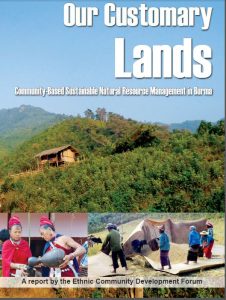 In January 2016 the government adopted a National Land Use Policy, which included the recognition of customary land management practices. While this is a welcome fi rst step in the necessary integration of Burma’s customary land management systems with the national-level system, there is an urgent need for constitutional reform and devolution of land management powers prior to any such integration […]
In January 2016 the government adopted a National Land Use Policy, which included the recognition of customary land management practices. While this is a welcome fi rst step in the necessary integration of Burma’s customary land management systems with the national-level system, there is an urgent need for constitutional reform and devolution of land management powers prior to any such integration […]
The right to land at crossroads in Myanmar
Myanmar is at a historic crossroads: one where the optimism of a critical juncture that is “more promising than at any time in recent memory” meets apprehension over what could happen if a “host of … social crises that have long blighted our country” go unaddressed […]
• • •2016 Trafficking in Persons Report – BURMA: Tier 3
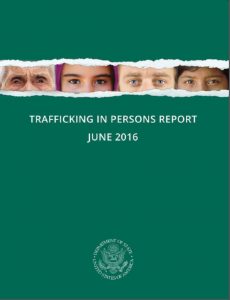 Burma is a source country for men, women, and children subjected to forced labor and for women and children subjected to sex trafficking, both in Burma and abroad. Some Burmese men, women, and children who migrate for work abroad—particularly to Thailand and China, as well as other countries in Asia, the Middle East, and the United States—are subjected to forced labor or sex trafficking […]
Burma is a source country for men, women, and children subjected to forced labor and for women and children subjected to sex trafficking, both in Burma and abroad. Some Burmese men, women, and children who migrate for work abroad—particularly to Thailand and China, as well as other countries in Asia, the Middle East, and the United States—are subjected to forced labor or sex trafficking […]
New Report: Military Confiscation of Burmese Ancestral Land in Karenni State
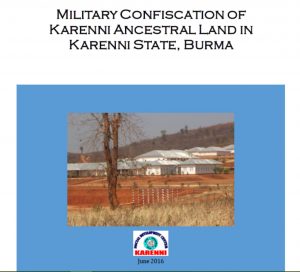 This report is based on direct testimony provided through interviews with 40 villagers between February 16 and March 28, 2015 […]
This report is based on direct testimony provided through interviews with 40 villagers between February 16 and March 28, 2015 […]
Human Rights Watch: “They Can Arrest You at Any Time” The Criminalization of Peaceful Expression in Burma
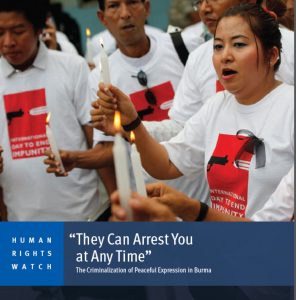 The past five years have been a time of liberalization and change in Burma. The abolition of prior censorship and a loosening of licensing requirements has led to a vibrant press, and the shift from formal military rule has emboldened civil society […]
The past five years have been a time of liberalization and change in Burma. The abolition of prior censorship and a loosening of licensing requirements has led to a vibrant press, and the shift from formal military rule has emboldened civil society […]
TRAINED TO TORTURE: Systematic war crimes by the Burma Army in Ta’ang areas of northern Shan State (March 2011 – March 2016)
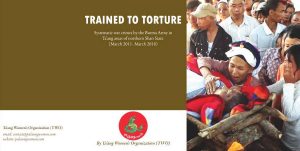 TWO documentation of human rights violations in Ta’ang areas of northern Shan State from March 2011 to March 2016 provides evidence that the Burma Army is committing war crimes, on a widespread, systematic basis – in particular torture, shelling of civilian targets, and forcing civilians to be porters and human shields […]
TWO documentation of human rights violations in Ta’ang areas of northern Shan State from March 2011 to March 2016 provides evidence that the Burma Army is committing war crimes, on a widespread, systematic basis – in particular torture, shelling of civilian targets, and forcing civilians to be porters and human shields […]
Briefing Paper: The legacy of mass torture and the challenge for reform in Myanmar
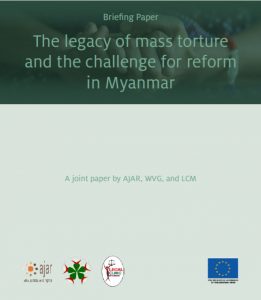 Torture has a long history in Myanmar and has been widely employed by the military regimes in power after 1962 […]
Torture has a long history in Myanmar and has been widely employed by the military regimes in power after 1962 […]
Report of the United Nations High Commissioner for Human Rights: Situation of human rights of Rohingya Muslims and other minorities in Myanmar
The present report, submitted pursuant to Human Rights Council resolution 29/21, examines the situation of human rights of Rohingya Muslims and other minorities in Myanmar […]
• • •“After release I had to restart my life from the beginning” The Experiences of Ex-political Prisoners in Burma and Challenges to Reintegration
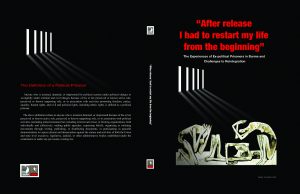 Since 1962, between 7,000 and 10,000 political prisoners have been imprisoned in Burma. Whilst a multitude of anecdotal records exist, there is very little comprehensive data concerning the torture and mistreatment experienced by political prisoners within Burma’s interrogation centers and jails […]
Since 1962, between 7,000 and 10,000 political prisoners have been imprisoned in Burma. Whilst a multitude of anecdotal records exist, there is very little comprehensive data concerning the torture and mistreatment experienced by political prisoners within Burma’s interrogation centers and jails […]

 All posts
All posts